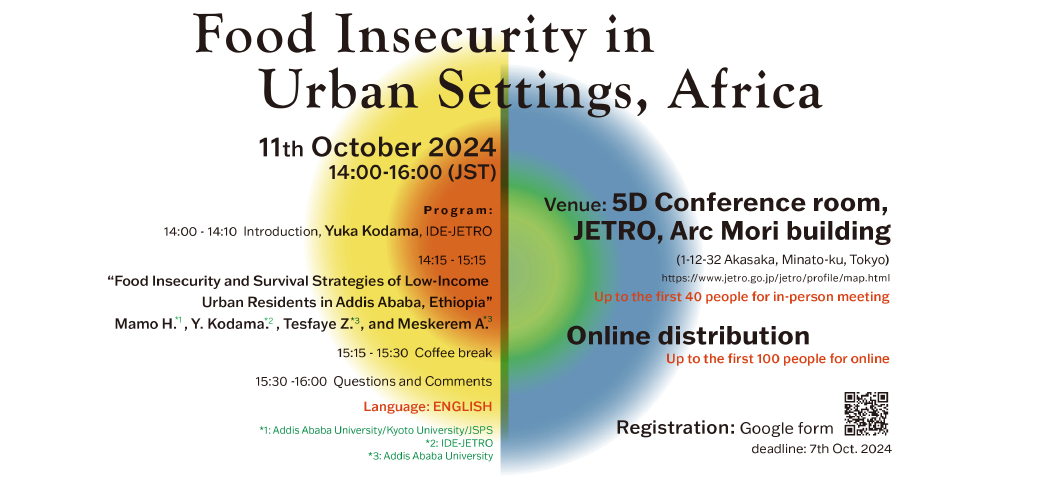【開催案内】The 9th IAfP Research Seminar “Food Insecurity and Survival Strategies of Low-Income Urban Residents in Addis Ababa, Ethiopia.”
Dr.Mamo Hebo has been engaged in extensive anthropological fieldworks in southern Ethiopia since 1999. His overall research interests include: human ecology of natural resources ownership and management, conflicts on resources ownership/use, conflict resolution with a focus on non-formal peacemaking mechanisms, inter-ethnic conflicts and solidarity, and rural livelihood strategies. Currently he is engaged in a joint research on Food insecurity in urban Ethiopia.
Title: Food Insecurity and Survival Strategies of Low-Income Urban Residents in Addis Ababa, Ethiopia.
Speaker: Mamo Hebo
Addis Ababa University/Kyoto University/Japanese Society for Promotion of Sciences
Date and time: 11th October, 14:00-16:00 at JST
Registration: https://forms.gle/W89EXgMT3X11YfGF7
*The deadline of the registration: 7th October 2024.
Venue[in-person]:Conference room, Arc Mori building
https://www.jetro.go.jp/jetro/profile/map.html
*Up to the first 40 people for in-person meeting.
Online distribution
*Up to the first 100 people for online.
Language: English
Brochure: PDF file (download)
Program
14:00 – 14:10 Introduction, Yuka Kodama, JETRO
14:15 – 15:15
Food Insecurity and Survival Strategies of Low-Income Urban Residents in Addis Ababa, Ethiopia.
Mamo H(1), Y. Kodama(2), Tesfaye Z.(3), and Meskerem A.(3)
(1)Addis Ababa University/Kyoto University/JSPS, (2) IDE-JETRO, (3) Addis Ababa University
15:15 – 15:30 Coffee break
15:30 -16:00 Questions and Comments
Abstract
Urban residents in Ethiopia have been struggling with the various state of food insecurity for decades. Government employees in general, and low-income urban residents in particular, have been suffering the most from food insecurity. The problem has intensified in recent years due to persistent inflation and lingering conflicts in different parts of the country, which have been seriously hampering food production and marketing. In order to ease the pressure on urban resident, the government has been undertaking a number of measures viz. implementing Urban Productive Safety Net Program (UPSNP) for the poorest section of urban residents; introducing school feeding program for children in primary schools; encouraging urban agriculture (e.g., garden vegetables & poultry production); establishing consumers’ association shops; and promoting Sunday markets- sprawling along portions of some major city streets where producers and cooperatives sell mostly agricultural products to urban consumers. The present project explores strategies adopted by low-income urban residents navigating through these and other options in order to survive food insecurity. While the project has adopted survey (forthcoming) as a main research method, this presentation is based on exploratory qualitative data (FGDs and KIIs) gathered in two districts of Addis Ababa, the capital and largest city of Ethiopia. Preliminary findings of this study show that: (1) almost all the research participants expressed food insecurity as their most significant concern; (2) daily street/neighborhood corner petty traders and mini-kiosks are major sources of food items households purchase; (3) purchase of food items is limited in volume and appears to be mostly on daily basis (for daily consumption); (3) change of dietary habit and food preparation traditions, and move towards less nutritious (fewer protein and more carbohydrate food items) have also come out as major strategies of survival.
Keywords: Addis Ababa, food insecurity, low-income, survival strategies, urban residents
Organizers: Institute of Developing Economies (JETRO); Center for African Area Studies, Kyoto University; African Studies Center, Tokyo University of Foreign Studies; Grant-in-Aid for Transformative Research Areas: Lifelong Sciences Research Project [No.20H05806]; Innovative Africa Program (IAfP), Graduate School of Asian and African Area Studies, Kyoto University.

